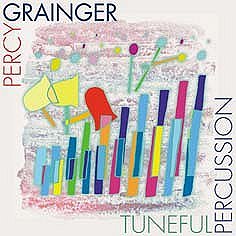Percy GRAINGER
Tuneful Percussion
 Woof! plus various musicians
Woof! plus various musicians
 Move MD3222 [54:15]
Move MD3222 [54:15]
divine art (UK importer)
move records

With the Chandos Grainger series well into double figures and the Australian
feature film Passion (1999) portraying the less salubrious aspects
of the composer's life, Percy Grainger is receiving more attention than at
any time since his death. Now comes the first complete recording of Grainger's
surviving 'tuneful percussion' pieces.
There are 16 pieces covering a wide variety of musics, original compositions
and arrangements of folk pieces, 'classical' works and what we now call 'world
music'. Grainger's interest in tuned percussion put him so far ahead of his
time that he had instruments built in-order to realise his musical ideas.
He established a museum in his own name at the University of Melbourne, where
many of the instruments are now kept, and from which Woof! have been
able to use the staff bells and steel marimba.
Woof! are a youthful four piece percussion ensemble based in Melbourne. They
have been together since 1995 and are all accomplished musicians with a lengthy
list of freelance credits, in addition to which: Christine Baker has played
with the Royal Concertgebouw Orchestra, Matthew Goddard, Stephen Hardie,
Tracey Patten with the Melbourne Symphony Orchestra.
The album is very well documented and clearly a labour of love. There is
a useful introductory essay - essential given that in these versions this
music will be new to just about everyone - and notes on each piece. Brian
Allison, curator of the Grainger Museum outlines the collection itself, as
well as providing some of Grainger's original sketches and three photographs
of the composer and his wife, Ella Grainger. One of these shows Ella playing
the steel marimba featured on the recording, while a second again shows Ella
at the marimba, accompanied by Percy playing the staff bells. In addition
to Woof! the album also features on various tracks soprano tenor and
bass, choir, strings, double bass, flute, harp and piccolo. Well printed
on glossy paper and free from the irritating clutter of multiple language
notes, the booklet is a model of clarity, the text delivering a wealth of
information.
The music itself ranges from the twee Shepherd's Hey (British
Folk-Music Settings No.4), which is jolly in an entirely innocent way
long out of fashion, to a lugubrious Londonderry Air - Irish Tune
from County Derry (British Folk-Music Settings). From an entirely different
tradition comes the Gamelan Anklung (berong Pengètjèt),
composed in a four-tone scale for tuneful percussion, piccolo and harmonium,
to illustrate "a typically Mongolian use of slow, well defined intervals."
The piece is, as intended, calm and restful. The Lonely Desert Man Sees
the Tents of the Happy Tribes shares material with Grainger's The
Warriors, while in arranging Bach, Blithe Bells is a most attractive
lullaby fantasia for piano and delicate mallet percussion. So it goes, each
piece distinctive, original, filled with imagination.
My only quibble would be, and given that Grainger himself was noted for multiple
and 'elastic' arrangements it is not much of a quibble, that at least two
of the works have been scaled-down. Compare the version of Debussy's
Pagodes (Grainger gave the British premiere of the original piano
piece in the autumn of 1905 at the Bechstein Hall, London) to the far more
atmospheric 1990 world première recording by Geoffrey Simon conducting
the Philharmonia Orchestra (Cala CACD1025). The Cala recording keeps to
Grainger's intent of employing 13 percussionists, 4 grand pianos, celesta,
dulcitone and harmonium. Woof!'s resources simply don't stretch this
far and the sheer esoteric nature of the arrangement is lost. Likewise when
comparing Woof!'s performance of Grainger's arrangement of Ravel's
La Vallée des cloche, the Australian's simply can not approach
the pure and magical textures of Simon Rattle's 1991 version with the City
of Birmingham S.O. (EMI CDC7 542042).
Nevertheless, this is still a fine album filled with uniquely delightful
music. Crossing all sorts of music boundaries simply by refusing to even
notice they exist, Grainger left an extraordinary legacy. In presenting this
programme Woof! have done that legacy a considerable service. You
may not hear anything as arrestingly beautiful as Arrival at Platform
Humlet or Bahariyale V. Palaniyandi in a hundred more conventional
releases.
Gary S. Dalkin

See also review by Christopher Fifield

